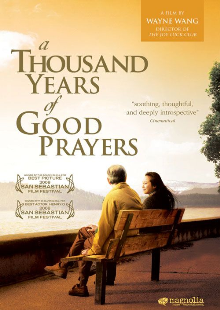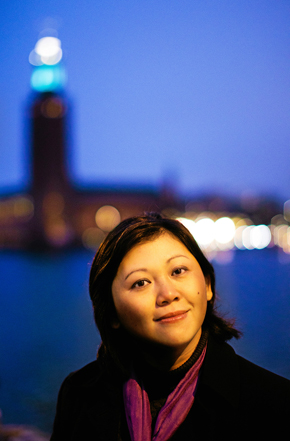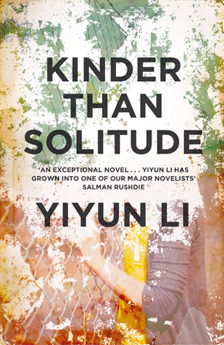Yiyun Li’s multiple moments
by Mark ReynoldsYiyun Li’s latest novel was inspired by a real-life poisoning case in China in 1995, in which a 19-year-old student was paralysed and severely disabled, but did not die. The culprit was never discovered, but suspicion still falls on a roommate from a well-connected family who subsequently fled to America.
The slow poisoning in Kinder Than Solitude, committed on an outspoken student activist by someone in a tight group of three teenage friends, takes place in the aftermath of the 1989 Tiananmen Square protests, but this is not an outwardly political tale; it has much more to say about the interior lives of the three kids, now adults in their 40s, and the psychological repercussions of a youthful transgression.
“I’ve always been curious about poisoning,” Li tells me with a sweet, conspiratorial smile. “I think any murder is interesting, any murder is a plot. Murders with a knife or a gun, or if you strangle someone, it has a lot to do with passion and impulse, but poisoning is a very cold-blooded, plotted murder. It’s very passive-aggressive, it’s an intimate crime – you have to know someone well to be able to do it, you have to know their habits, the food they eat. So I started with the thought that I wanted to write the psychological violence of the poisoning case.”
The real-life poisoning was a collective mystery for Li’s generation, and she uses it as a starting point for a quietly gripping exploration of damaged lives.
“The poisoning came before anything else,” she explains. “I knew there was a poisoning, and I knew the woman at the centre who was poisoned. I didn’t know her well when I started; I knew she was going to be at the centre as an absence. And then I started to know her a little bit and clearly she was connected to the protest. I don’t think Tiananmen Square is a big part of the novel. It’s very far in the background. My major motivation was to find out who the other characters were, and how it happened that this one woman got poisoned. And so I started to learn about the other three characters by writing them.”
The three main characters experience different types of self-imposed solitude: Boyang is a businessman who stays behind in Beijing and effortlessly rides China’s economic boom, but lives an empty, regretful existence, while the two women, Moran and Ruyu, quietly take undemanding jobs in their separate adopted American neighbourhoods. They each have at least one failed marriage behind them.
The title Kinder Than Solitude is double-edged, suggesting both companionship and obliteration, and has its roots in a short story Li wrote and then abandoned.
“It was actually the title of a story I wrote about Moran and her ex-husband Jozef. It was a completely different story, but it was those two characters in the novel who have lunch together every year on his birthday after their divorce and he jokes that his obit will say ‘survived by a loving ex-wife’ – those things were in the story. My editor at the New Yorker said, ‘I don’t understand why she was not saying anything in the story about her past’, and I realised that was exactly what happened, she was hiding this big thing from Jozef. I had the story, and I had a poisoning case. But I didn’t immediately make the connection that she was hiding the poisoning.”
In the novel’s lightly comical opening, Boyang goes alone to the crematorium for the funeral service of the poison victim Shaoai, where visitors jostle for attention and service with an eagerness “reminiscent of the marketplace or the stock exchange”. But it’s clear from the off that the most interesting drama is taking place within the characters’ heads.
“On the surface there are a lot of dramas,” Li affirms, “but if you don’t remove yourself, or if you don’t move your angle, you get trapped in those little surface dramas. If I can remove myself and put a distance and re-examine what’s underneath, that’s my goal.”
The chapters each read rather like self-contained short stories. There are jump-cuts between the past and present, and throughout the book, between the chapters and within each chapter, personal memory always inhabits the present in a way that rings strikingly true.
“I always tell my students we live in multiple moments; we live at this moment but we also live in the past and the future. If you write about the drama at the surface oftentimes you’re just focusing on one moment, but if you step away from that drama you’re actually writing about multiple moments.”
In the end, whatever events may have occurred in the two decades between the poisoning and Shaoai’s death are almost immaterial: the poisoning and its aftermath have come to define these characters’ lives and make them inseparable, and to “turn their decades of accumulation – marriage, children, career, wealth – into a hoarder’s laughable collection.”
“I always wonder about them, you know, how they live between those two moments. I feel they have been waiting for the death, all three of them.”
The death cannot deliver any meaningful closure (as few events can), but only reminds them of the impossibility of starting afresh: “Once and again we lie to ourselves about starting with a clean slate, but even the most diligent wiping leaves streaks – fears, distrusts, the necessity of forever questioning the motives of others.”
At the beginning there was a period of hope that everything was going to be more open and more democratic, but right after June 4th the media were all saying that nobody was killed in Beijing; of course we saw different.”
Since Li herself was a teenager in Beijing at the time of Tiananmen, I’m curious about her personal recollections of the student protest, the military clampdown, and the way those events were portrayed within China.
“I would call myself a close witness of everything that happened,” she says deliberately. “My sister was in college and all the college students were having strikes and protesting and I was in high school and my school went to Tiananmen Square several times and one of my friends was there the night of the massacre. So not a direct witness, but it’s a very close witnessing of the events during the three months of protesting. It was infuriating how the media portrayed the whole thing, the official news was lying, and everyone in Beijing knew that. At the beginning there was a period of hope that everything was going to be more open and more democratic, but right after June 4th the media were all saying that nobody was killed in Beijing; only the soldiers were attacked and killed by the mobs. It was really the official line that nobody was killed, and of course we saw different. You realised it’s the moment you became a grown-up.”
Li left China for the US in 1996, and knew immediately that the switch would be permanent – even though that meant leaving her parents behind.
“In my generation a lot of people left and then went back to China. But for me it was a very clear decision the moment I left that I would not return. I left by myself, my parents still live in Beijing. But I knew I was going to leave China from a very young age; I knew that I wanted to go to America. Doing what, I had no idea, but I wanted to leave. In my twenties even the idea of just starting afresh somewhere else was good enough.”
Li had studied science in Beijing and completed a Masters in Immunology at Iowa before switching to MFA programmes in both Creative Non-Fiction and Fiction. So at what point did she realise she wanted to embark on a career as a fiction writer?
“I was in the science programme for three-and-a-half years, and during that time I was writing on my own and I took a couple of community classes. And I really started to get serious, I really loved writing, to the point where I thought, gosh, who’d want to be a scientist for life? Then I went into a bookstore and I picked up a book – it probably just happened to be not a good book – and I thought, I can do this! I can do better than this! So with that combination of you know you want to do something so much and you realise you may have the capacity to do it, I decided to quit science.”
I ask whether the Creative Non-Fiction programme was intended to bridge the divide between being a scientist and a fiction writer. It turns out it wasn’t thought through like that.
“Actually the only reason I was in a non-fiction programme was because those were two separate programmes in Iowa and I got into the non-fiction one first, at a time when I really needed a student visa. It was purely for practical reasons, and I thought, yes I’ll go and write creative non-fiction while I wait to get into the fiction programme. But I learned a lot and met my best friends in the non-fiction programme, so it was a very good experience.”
Li was a voracious reader as she was growing up, devouring all the literature she could get her hands on.
“There was very little children’s literature in China then,” she recalls, “so I started reading really serious literature when I was very young. I read Tolstoy when I was 9. I’d read anything. Not having enough books around, I read non-selectively. But fairly quickly I started to read a lot of Russian literature – of course there was a lot of Russian literature already translated into Chinese. Later I started learning English, and that was when I really read, you know, Dickens and Hemingway, all these people that were available in China in English.”
Someone interviewing me once asked who my characters read, and I thought that’s a very good question, that’s exactly what I like to think about.”
Moran recalls a passage from Dr Zhivago about parallel lives moving at different speeds. It doesn’t match up to her memory of reading it for the first time in Chinese, and reading it again in English it strikes her as mundane, but it nonetheless captures the dynamic of the three protagonists drifting in time together from the moment their paths first crossed. The Pasternak novel also deals with themes of solitude and individuality, so how much was Dr Zhivago an influence on the book, and on Moran’s character in particular?
“You know, Moran was not a fiction reader for the longest time,” she reflects, “and then right after the poisoning she read Dr Zhivago and a lot of French literature, and I think partly that was her escape. She did not have her world any more, so Dr Zhivago especially was very important for her. Someone interviewing me once about my first novel asked who my characters read, and I thought that’s a very good question, that’s exactly what I like to think about.”
I decide to play the game: “So who does Boyang read?”
“He’s not a reader,” she deflects. “At one time of their childhood he read a lot about Beijing history, old books about Beijing, and I think he enjoyed that partly for the friendship and companionship between him and Moran – it was almost like a private language between those two that nobody could share. But after the poisoning he was not interested as the two women are in human psychology.”
Boyang takes his present girlfriend Coco to some of the old haunts where he and Moran used to hang out, which leads to the question of how recognisable Beijing is today compared with the city Li and her female characters left behind.
“Probably not very recognisable. Most of those places are gone. The lake they used to go to was a very lovely, tranquil neighbourhood, but now it’s a tourist centre with all these pubs catering for expats more than Chinese. I read somewhere it’s the ‘sexiest spot in Beijing’ with all the nightclubs. It’s a loss for Boyang. He stayed while the two women left the city – he did not give up the city, but the city was gone.”
Li has only been back to China a couple of times since she left: “I would actually love to go more often, and the reason we haven’t is the children are very young and one of them has bad allergies and there is pollution everywhere. It used to be industrial pollution, but now there are a lot of coal mines, and also homes burning coal in the winter, it’s quite shocking how polluted the whole country is.”
I’m surprised to learn that none of Li’s books have appeared in China, but she refuses to sanction the translation of her work into Chinese for a combination of reasons.
“My work is very difficult to directly translate,” she declares. “I think I’ve become infamous for not accepting offers, and people sometimes get upset at my insistence that I don’t want my work to be translated. There are some very bad translations of my stories on the internet, without my permission. In one, I saw one sentence about a cloud and if you translate it back the translation would be ‘the white, fluffy cloud’. I would never write a line like that in my life! The whole intonation, the language, is different. It’s almost that I have to translate myself, but I don’t write in Chinese, so it’s complicated.”
 Wayne Wang has made two films based on Li’s stories, and she wrote the screenplay for A Thousand Years of Good Prayers (2007) almost from scratch.
Wayne Wang has made two films based on Li’s stories, and she wrote the screenplay for A Thousand Years of Good Prayers (2007) almost from scratch.
“It was a fascinating experience,” she remembers. “Of course I’d never written a script, so I went to see him and I said, ‘You need to tell me how to write a screenplay,’ and he said, ‘This is how you write a screenplay,’ and gave me a copy of Final Draft – ‘Use this software,’ that’s all the help I got from Wayne at the beginning. There are not many comedies in my life but the whole writing of that screenplay was a comedy. Because I didn’t know how to write it, I just refused to write. He didn’t tell me a deadline, but then one day he called me and said, ‘I got money. I want to see a draft.’ So I wrote a draft in two weeks and sent it to him, and he called me right away and said, ‘This is not a screenplay, this is a radio play.’ So I said, ‘Tell me how to write,’ and he said, ‘I don’t know how to write, but I want 40 per cent of silence time in your script, because if you don’t have silence I cannot direct and the actors cannot act.’ That was a good lesson for me, that characters don’t have to talk. After that, the second draft was really easy, I realised what he was asking me was just telling the story again in a different format.”
She’d willingly endure the process again if she were asked to adapt another of her novels or stories, “but I would not seek the opportunity, it’s not the most satisfying thing, writing films.” In the meantime, it’s back to – mostly – familiar terrain.
“I’m writing stories again. I am very stubborn that I want to write both novels and stories. Some people only write one form, and I love short stories. I have half a collection of stories written whilst working on Kinder Than Solitude, so now I think I’m going to finish the other half, and probably start a novel, and I also have the idea of writing an essay collection – just very traditional essays. I read mostly dead people, and when I read I make comments and in the margins I have these sort of conversations with them, and I thought maybe I could have a collection of essays just talking to dead people. At least that’s my thinking.”
Yiyun Li’s debut collection, A Thousand Years of Good Prayers, won the Frank O’Connor International Short Story Award, PEN/Hemingway Award, Guardian First Book Award, and California Book Award for first fiction. Her novel The Vagrants won the gold medal of California Book Award for fiction, and was shortlisted for Dublin IMPAC Award. Gold Boy, Emerald Girl, her second collection, was a finalist of Story Prize and shortlisted for Frank O’Connor International Short Story Award. Kinder Than Solitude is published in the UK by Fourth Estate. She also recently adapted the story of Gilgamesh for the Save the Story series published by Pushkin Press and illustrated by Marco Lorenzetti, as featured on Bookanista. Li lives in Oakland, California with her husband and their two sons, is a contributing editor to the Brooklyn-based literary magazine A Public Space, and teaches at University of California, Davis.
yiyunli.com
Mark Reynolds is a freelance editor and writer, and a founding editor of Bookanista.



